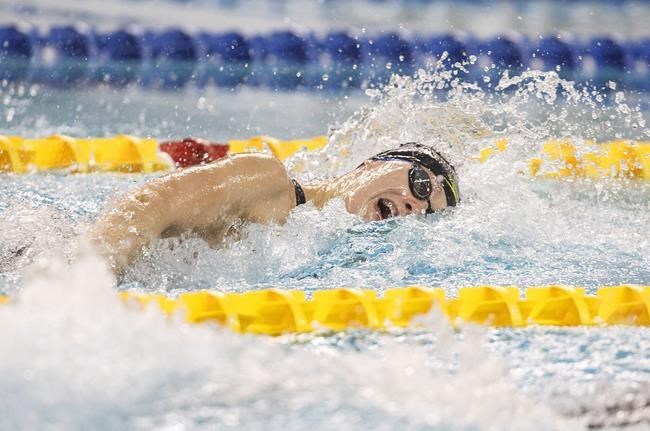Canada's athletes face increased manpower and facility costs, plus regular testing, when they return to the pool, track, gym and pitch.
The purpose of the $5 million jointly announced Monday by the Canadian Olympic and Paralympic committees and Own The Podium is to cover those extra costs imposed by the COVID-19 pandemic.
The money will come from cutbacks to other programs, COC chief executive officer David Shoemaker said.
"We want to make sure if our athletes across the country are returning to training, that they're doing so in a way that's not just safe for them, but is also safe for their families and safe for their communities," he said on a conference call.
"Just as public health was our North Star when Canadian athletes decided to stop training back in March, public health will remain our North Star as we begin a phased-in approach to return to sport."
The Tokyo Olympic and Paralympic Games scheduled to open in July were postponed until 2021.
Canadian athletes, particularly those in indoor sports, have been largely confined to training at home since March.
The federal government announced last month a $72-million injection into the amateur sport system to try to keep organizations afloat.
"While the government's investment was focused and aimed at the viability of sport, for us, this investment is aimed at the return to sport and they're slightly different focuses, but important," Shoemaker explained.
"Our role as sport-performance partners nationally and specifically for the Canadian Olympic Committee, is to invest in putting Canadian athletes and Canadian teams on podiums."
Swimming Canada released guidelines Friday on what training groups must look like when pools get the green light from public health officials to open.
The four pools where the national team trains in Montreal, Toronto, Vancouver and Saanich, B.C., are currently closed.
One swimmer per lane in the early phases means smaller training groups in the pool over several hours, thus increasing hours for coaches, staff and facility rental.
"Our norm is to have a full training squad all in the pool at the same time," Swimming Canada CEO Ahmed El-Awadi said.
"Definitely the costs will increase in the short term.
"These funds come into play and are super-critical in kickstarting the high-performance program."
Paralympic athletes requiring physical assistance to pursue their sport may face extra challenges upon return, according to Canadian Paralympic Committee CEO Karen O'Neill.
"If an athlete needs some care with transfer, how do we look at all elements in that environment to make sure it's safe and healthy, with equipment transfer either into a chair or a canoe/kayak or a sport chair?" O'Neill asked.
Own The Podium makes funding recommendations distributing $70 million annually to national sport organizations based on medal potential, and also provides technical advice to those bodies.
A return-to-sport task force, chaired by OTP head Anne Merklinger, has yet to determine how the $5 million will be distributed.
"This is our next conversation at the task-force level," Merklinger said.
"When you look at outdoor sport, their ability to return to sport will vary greatly compared to an indoor aquatic sport, for example, where you have more sophisticated protocols, sanitizing and cleaning methodologies required."
Shoemaker was hopeful, but not certain, that all Canadian sport bodies will survive the pandemic.
"The COVID-19 pandemic and the postponement of the Olympic and Paralympic Games has had very significant impact across sport in Canada," he said. "Certain national sports organizations are suffering severely from it.
"The government announced a $72-million investment that was designed in large part to make sure our sport organizations remain viable going forward. I like to think that will be the case.
"The story is not completed on COVID-19. We don't know how this all finishes yet. We can't be certain as we sit here today that will solve the problem."
As with pro athletes, Olympians and Paralympians will require regular testing as they mix with staff and other athletes upon return to training.
"It's certainly within our contemplation that this investment could go towards having the capacity with machines and test kits to test Canadian athletes, coaches and support systems in institutes and other training centres for COVID-19 and other infectious disease," Shoemaker said.
This report by The Canadian Press was first published June 1, 2020.
Donna Spencer, The Canadian Press



